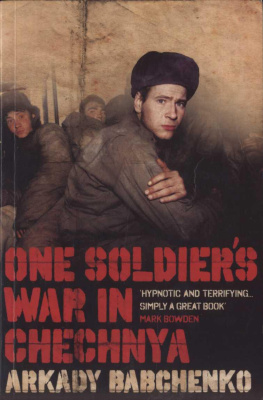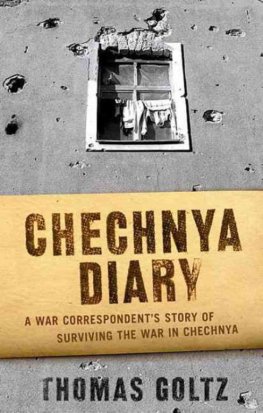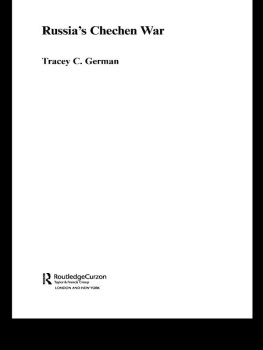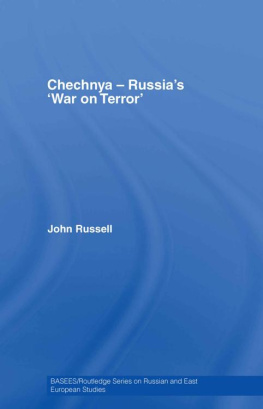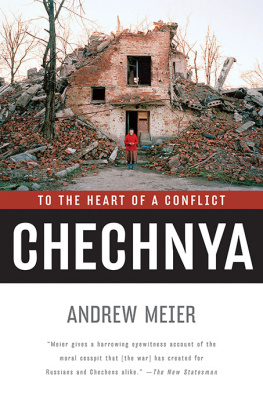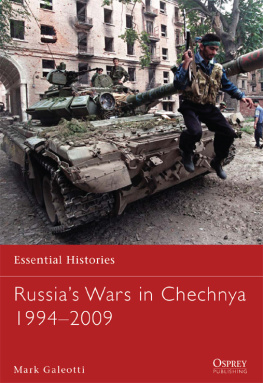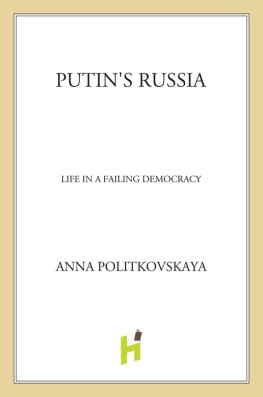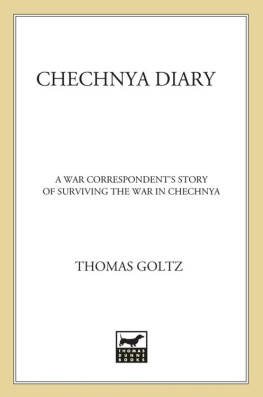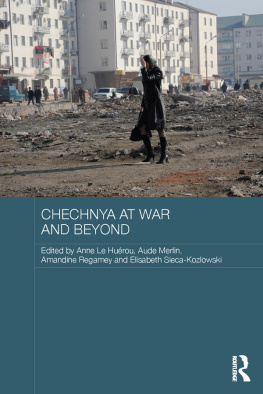ONE SOLDIERS WAR IN CHECHNYA
ARKADY BABCHENKO was born in 1977. In 1995, at the age of 18, he was drafted to fight in the first Chechen War and then in late 1999 volunteered to return for six months during the second Chechen War. A law graduate, he currently works as a journalist on the non-conformist newspaper Novaya Gazeta.
This is his first book.
NICK ALLEN is a British journalist working for the German Press Agency DPA in Pakistan. He worked in Russia for 11 years, also covering the conflict in Chechnya, and has translated for the literary journal Glas New Russian Writing.
From the international reviews of One Soldiers War in Chechnya:
Like Tolstoy, Babchenko was a Russian soldier in the Caucasus before he was a writer, and his remarkable stories cast a frequently shocking light on the barbaric conduct of the occupying forces... In the tradition of Joseph Hellers Catch-22 or Ernest Hemingways A Farewell to Arms [...] One Soldiers War is an artfully contrived narrative deploying fictional techniques as well as autobiography... A devastating testimony from an extremely talented young writer. New Statesman
Illuminating and darkly humorous... Babchenko is also capable of arresting lyricism. Daily Telegraph
Arkady Babchenkos prose is raw and uncut and his subject matter is one of the most terrible wars in the world - without a doubt the most under-reported... Babchenkos book is an account from an ordinary Russian grunt, and its fundamental honesty makes unbearable reading... A fine book. Literary Review
A riveting, semi-autobiographical soldiers tale of brutality and boredom in the Chechen war Boyd Tonkin, Independent
'One Soldiers War is a gripping narrative and a sobering one. For all the horrors he describes, Babchenko doesnt seem to intend a simple antiwar message; nor does he judge the moral rightness of the Chechen war. The book itself comes garlanded with comments comparing it to All Quiet on the Western Front and other masterpieces of combat literature... it certainly deserves a place in that notable literary tradition [...] for showing us that war, up close, could be as appalling toward the end of the 20th century as it was at the beginning. Watt Street Journal
Remarkable - my book of the year. Matthew Sweet, Night Waves, BBC Radio 3
Arkady Babchenko fought in both Chechen Wars. One Soldiers War in Chechnya is the extraordinary result, as damning as it is harrowing. It tells all those stories that were never allowed to appear in the press at the time... His account is vivid, stark and horrifying. The cruelty is all the more wrenching because of the moments of fleeting, lyrical beauty. Babchenko, like the best war reporters, is able to report war how it is, but also reflect on it... Babchenkos honesty is unblinking, his prose at times, unbearable. It is a tour de force. A grim testament to the worst of wars. New Humanist
Right up there with Catch-22 or Michael Herrs Dispatches. Tibor Fischer
I have not read a book about war and soldiering like it since All Quiet on the Western Front. Babchenkos prose, like Remarques, is stark but evocative, eloquent in its simplicity, and absolutely unflinching in its honesty. He presents the face of war with all cosmetics off, an utterly brutal and brutalizing experience that does nothing but kill and maim people spiritually as well as physically. His book should be required reading for anyone who still harbours the illusion that war has some redemptive qualities. Phil Caputo, author of A Rumor of War
Arkady Babchenko has written a hypnotic and terrifying account of his enforced participation in the Chechen wars, one that is entirely free of the self-absorbed razzle-dazzle that too often passes for literary writing these days. The books power is in its clarity and detail. Babchenkos honesty has the force of a blunt object. He is surrounded by killing and by death, eager for a wound that will not kill him but take him out of hell. The killing he does shatters him to his core. It is simply a great book. Mark Bowden, author of Black Hawk Down
Babchenkos clear, vivid, factual language, and his mercilessly detailed descriptions of sensual experiences, absorb the reader and torpedo any reflex to suppress emotion. Pictures stay with the reader, which are impossible to forget. Berliner Zeitung
This literary account from the front is a modern equivalent of All Quiet on the Western Front: harrowingly good. SonntagsZeitung
ONE SOLDIERS WAR IN CHECHNYA
ARKADY BABCHENKO
Translated from the Russian by Nick Allen
Preface
It would be wrong to think that the war in Chechnya began the day the federal army was brought in. And there was certainly more than one motivation behind it. Chechnya is a complex tangle of factors and accidents, a whirlwind of events that the future historian will have difficulty sorting out.
The Chechnya conflict started in the early 1990s, soon after General Dzhokhar Dudayev came to power. He had been a pilot in the Soviet air force and fought in the Soviet-Afghan war. From the outset he followed the policy of political independence for Chechnya, and ultimately declared its cession from the Russian Federation.
In 1991 Dudayev expelled Russian army forces from the territory of Chechnya. When the army withdrew, a huge amount of ammunition was left behind. More than two hundred airplanes were abandoned in the airport of Grozny alone, together with tanks, armoured carriers, artillery and even several Grad rocket launchers. The amount of weaponry was simply astounding - whole ammunition depots, tens of thousands of units, were simply left behind.
Lawlessness and chaos set in after Dudayev had announced a 100 per cent amnesty for all criminals, without exception, which led to a huge influx into Chechnya of all kinds of people who were in trouble with the law. The immediate result was an outbreak of banditry, and before long murder and robbery had become commonplace; more often than not, non-Chechens were the victims. A wave of Russian refugees flooded into Russia from Chechnya. It would be wrong to say that the genocide of the non-Chechen population was a state policy, but Chechens, whose society is based on a system of clans known as teips, were certainly better protected. (Chechnyas current president, Ramzan Kadyrov, belongs to the Benoi Teip, for example.) Since Russians have no teip system they found themselves completely defenceless: no-one was going to avenge their deaths, and this made them easy prey.
Growing gangsterism and unemployment undermined Dudayevs authority and caused a split among the population. This conflict was exacerbated by the fierce struggle for domination going on among the teips. In November 1994, pro-Moscow opposition forces led by Umar Avturkhanov stormed Grozny and were defeated. Twenty Russian tanks were destroyed together with their crews, and the few surviving tankmen were captured. Moscow renounced them - President Boris Yeltsin, a despotic ruler, couldnt have cared less about individuals, and he was infuriated that General Dudayev had acted beyond his authority. In my opinion this was the real reason federal forces were sent into Chechnya.
The military operation to overthrow the Dudayev regime was launched on 11 December 1994. It was poorly planned - recall the then Minister of Defence General Grachyovs announcement that he would capture Grozny with two regiments in two hours. From the outset, the army was betrayed by the high command. Its soldiers were insufficiently trained, depressed and demoralized; they did not understand the aims of this war, and they were treated as cannon fodder.
That December in Grozny the Russian army bore huge losses. On New Years Eve, the 131st Maikop brigade was almost completely wiped out. Various other units approaching the city from different directions were blocked and partially destroyed. People were killed in their thousands. To this day there are no official statistics for casualties in the first Chechnya campaign. Under the current Russian government well never know them anyway because they are catastrophic. But according to unofficial information, in January alone almost five thousand Russian officers and soldiers were killed in the Battle of Grozny.

